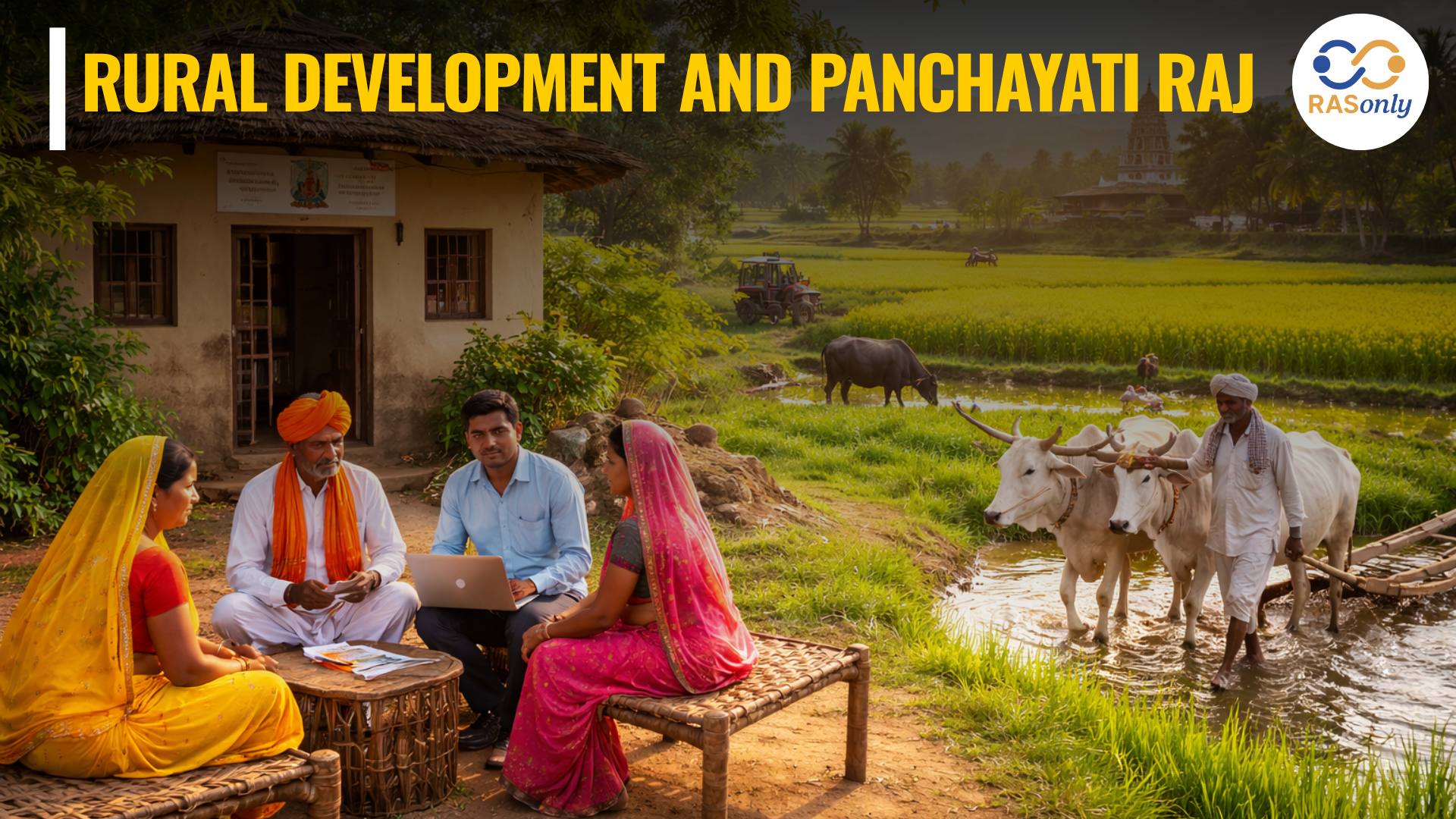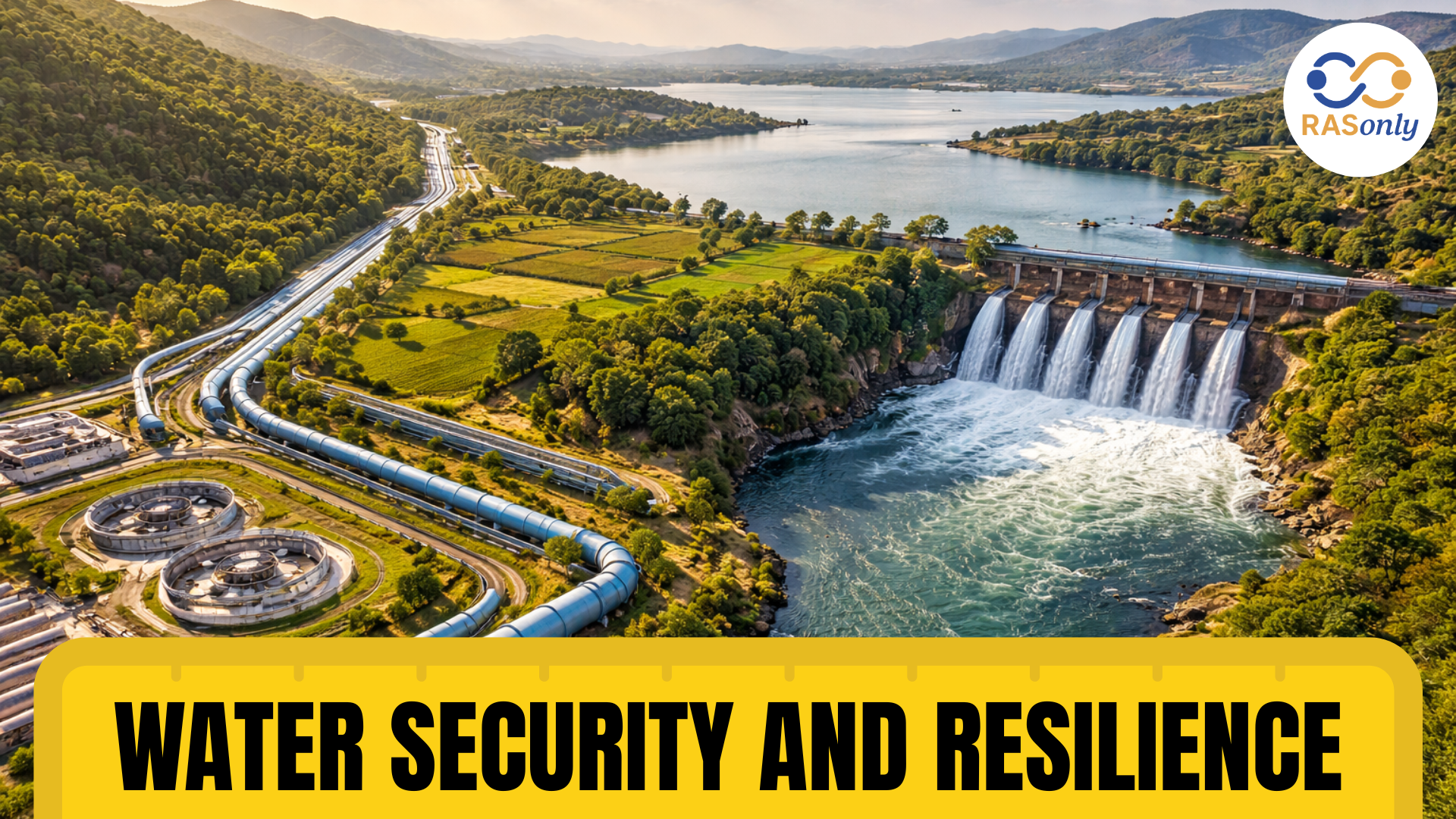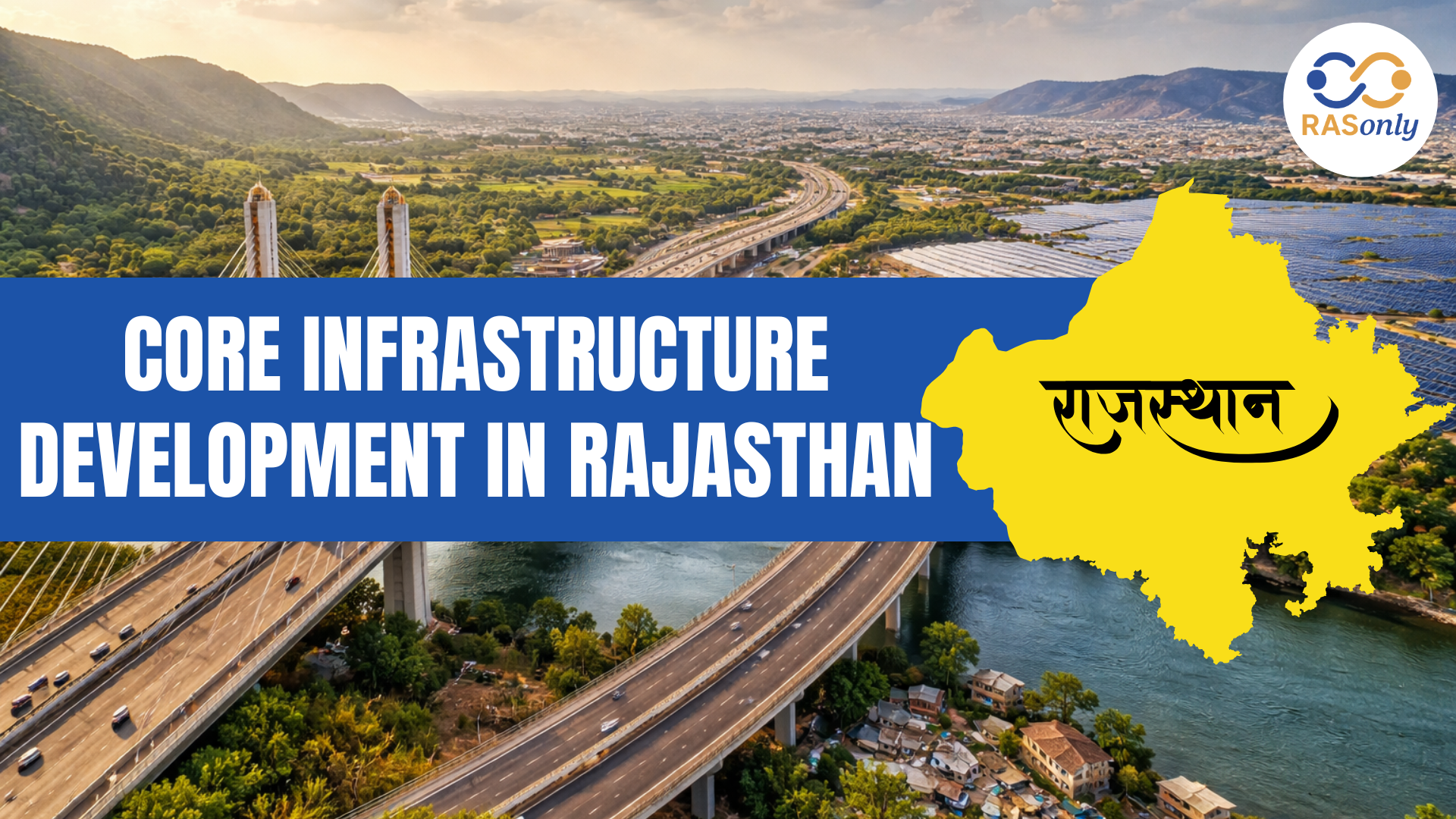Empowered Panchayats, Prosperous Rural Rajasthan
- >
- Preparation Tips
- >
- Prepare for RAS Mains 2026 in 50 days: A Comprehensive Study Plan
Prepare for RAS Mains 2026 in 50 days: A Comprehensive Study Plan

Get in Touch with RASonly!

Preparing for the RAS Mains Examination within a limited timeframe of 50 days is one of the biggest challenges an aspirant can face. The Rajasthan Administrative Services exam is demanding because of its wide syllabus, descriptive answer writing format, emphasis on Rajasthan-specific knowledge, and intense competition. To succeed, aspirants need a strategy that is disciplined, structured, realistic, and adaptable. This plan is designed to help you cover the entire RAS Mains syllabus thoroughly while improving your writing skills, mastering current affairs, and optimizing time.
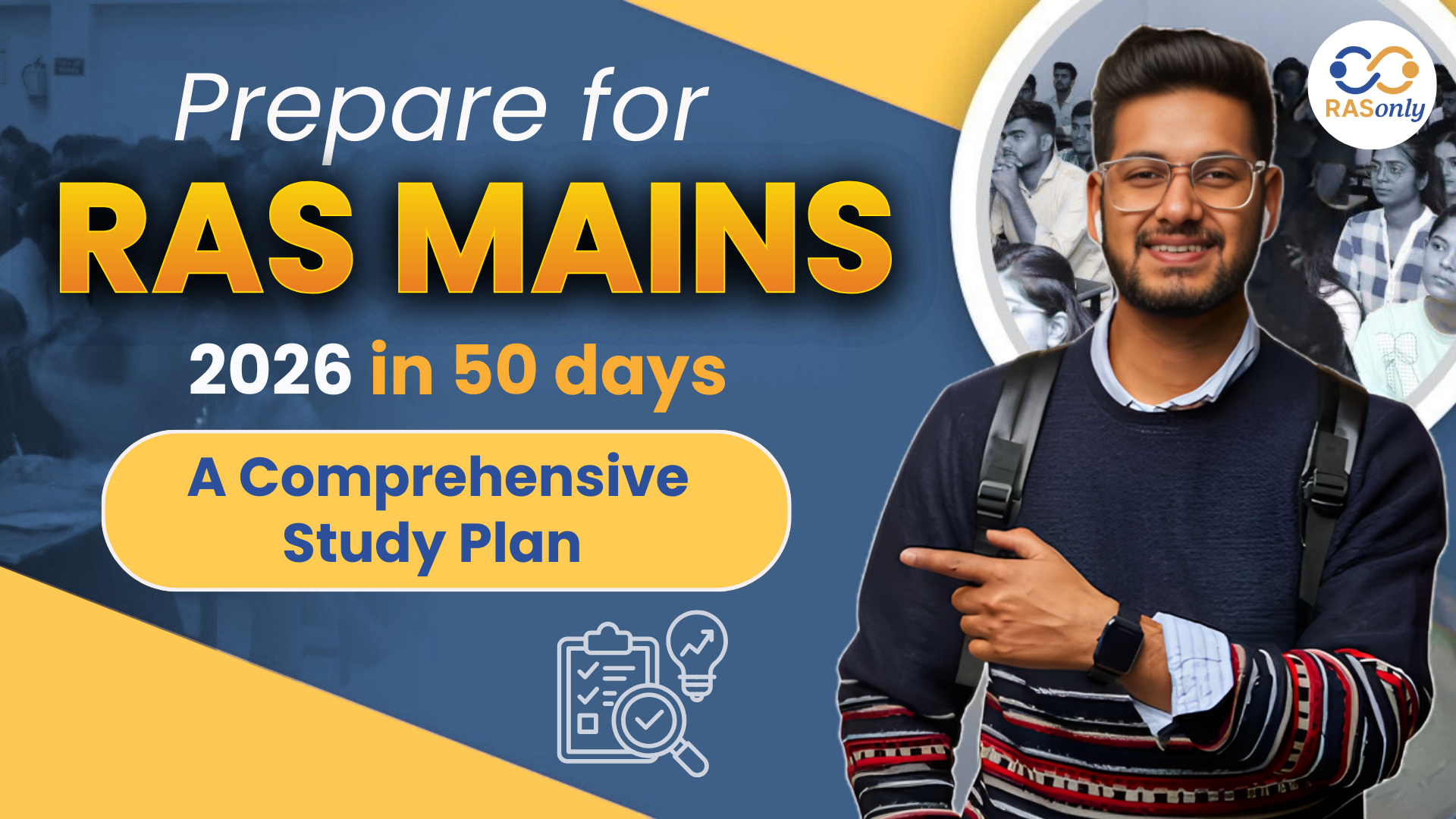
Preparing for RAS Mains 2026 in 50 days requires strategic organization to achieve significant improvement. Your performance in the exam depends on learning the exam format while studying the curriculum and organizing efficient time management for all subjects. Attention should be given to essential topics alongside the revision of critical ideas, followed by steady answer-writing practice. Achieving consistent work patterns remains the main obstacle because the wide syllabus demands effective time management for studying General Studies along with Rajasthan-specific topics and current affairs. Staying current with Rajasthan news should be your top priority, and you must tackle weak areas while taking regular mock tests to build a better understanding. To approach the exam with confidence, you should train equally in your core subjects and write answers while consistently reviewing your materials.
Prepare for RAS Mains 2026 Step-wise Study Plan for the Exam
Before beginning your studies, you must grasp both the RAS Mains exam pattern and its syllabus. To deal with it properly, you must follow this method;
Step 1: Understand the RAS Mains Exam Structure and Syllabus (Day 1-2)
The RAS Mains consists of various sections that contain three General Studies papers as well as General English and General Hindi sections.
| Papers | Subject | Total Marks | Total Duration |
|---|---|---|---|
| Paper-I | General Studies-I | 200 | 3 Hours |
| Paper-II | General Studies-II | 200 | 3 Hours |
| Paper-III | General Studies-III | 200 | 3 Hours |
| Paper-IV | General Hindi and General English | 200 | 3 Hours |
Each paper in RPSC Main Examination RAS Mains 2026 includes questions from three sections that designate Short, Medium, and Long responses according to the examination scheme. The distribution of questions along with the value of their respective marks appears as follows:
Pattern of RPSC Main Examination Paper-I: General Studies-I
| Part | Nature of Questions | Number of Questions | Marks per Question | Word Limit | Total Marks |
|---|---|---|---|---|---|
| Part-A | Short Answer Type | 25 | 02 | 15 | 50 |
| Part-B | Medium Answer Type | 16 | 05 | 50 | 80 |
| Part-C | Long Answer Type | 07 | 10 | 100 | 70 |
Pattern of RPSC Main Examination Paper-II: General Studies-II
| Part | Nature of Questions | Number of Questions | Marks per Question | Word Limit | Total Marks |
|---|---|---|---|---|---|
| Part-A | Short Answer Type | 15 | 02 | 15 | 30 |
| Part-B | Medium Answer Type | 14 | 05 | 50 | 70 |
| Part-C | Long Answer Type | 10 | 10 | 100 | 100 |
Pattern of RPSC Main Examination Paper-III: General Studies-III
| Part | Nature of Questions | Number of Questions | Marks per Question | Word Limit | Total Marks |
|---|---|---|---|---|---|
| Part-A | Short Answer Type | 25 | 02 | 15 | 50 |
| Part-B | Medium Answer Type | 16 | 05 | 50 | 80 |
| Part-C | Long Answer Type | 17 | 10 | 100 | 70 |
Pattern of RPSC Main Examination Paper-IV: General Hindi & General English
| Part | Nature of Questions | Total Marks |
|---|---|---|
| Part-A | Short Answer Type | 70 |
| Part-B | Medium Answer Type | 80 |
| Part-C | Long Answer Type | 50 |
Step 2: Review the syllabus properly
Prepare for RAS Mains 2026 examination features four descriptive papers consisting of History, Geography, Polity, Economy, Science & Technology, Ethics, Public Administration, and Current Affairs together with General Hindi and English. The successful completion of this demanding part of the competitive selection process depends on a structured plan and analytical writing with a clear understanding of concepts.
Paper I - General Knowledge & General Studies
| Unit | Topics Covered |
|---|---|
| Unit I: History | Rajasthan History & Culture: Prehistoric to 18th-century events, major dynasties, peasant and tribal movements, freedom struggle, art, architecture, literature, folk traditions, religious movements, saints and Lok Devtas. Indian History & Culture: Indian heritage, fine arts, performing arts, literature, architecture, religious movements, modern India (19th century–1965), national movement, post-independence reorganization. Modern World History: Renaissance, Reformation, Industrial Revolution, Imperialism, colonialism, world wars, global political and economic changes. |
| Unit II: Economy | Indian Economy: Agriculture, industry, services, banking and finance, RBI, fiscal policies, tax reforms, economic liberalization, poverty alleviation programs, employment schemes. World Economy: Global economic issues, World Bank, IMF, WTO, and India’s role in the global economy. Rajasthan Economy: Agriculture, dairy, industries, major development projects, public-private partnerships, economic growth initiatives. |
| Unit III: Sociology, Management, Accounting & Auditing | Sociology: Social values, caste system, secularism, tribal communities of Rajasthan. Management: Leadership theories, HR management, marketing, financial management, decision-making. Accounting & Auditing: Financial statements, budgeting, corporate governance, public finance audits. |
Step 3: Assess Your Current Preparation Level (Day 3-4)
Evaluating your knowledge level stands as a crucial step before starting the study plan.
- Self-Assessment Requires Diagnostic Tests or Past Papers for Discovering Subject Strengths and Weaknesses.
- Your strengths become apparent if you identify the subjects and topics where you excel currently.
- Weaknesses stand out as the subjects or topics which require your increased attention.
- Check your study resources including books and notes to verify you have sufficient materials that let you study all topics within the syllabus.
Step 4: Create a Detailed 50-Day Study Plan (Day 5-6)
Prepare for RAS Mains 50 days requires efficient time management to achieve success. Create a daily schedule for studies that contains:
- Design your time allocation based on the exam structure and your high and low-performing subjects. Devote greater moments to academic fields that present a challenge to you.
- The time allocation should be higher for academic areas which need additional emphasis including Rajasthan-specific material and modern news and response writing protocol.
- Wish to Revise? Dedicate scheduled time exclusively for exams during the last week before the exam date.
For an illustration, the following could be a sample daily timetable:
- Morning (3-4 hours): General Studies Paper 1 topics (e.g., History, Geography)
- Midday (2-3 hours): General Studies Paper 2 topics (e.g., Polity, Economy)
- Afternoon (2 hours): Rajasthan-specific subjects (e.g., Rajasthan History, Culture, and Economy)
- Evening (1-2 hours): Answer writing practice, Current Affairs revision
- Night (1 hour): Reading General Hindi or English
Step 5: Start with Core Subjects (Day 7-20)
During this period you need to establish a solid base of knowledge for core topics from both General Studies and Rajasthan-specific material.
General Studies Paper 1:
- History (Ancient, Medieval, Modern): Focus on key events, important figures, and their relevance. The physical geography of India and Rajasthan alongside environmental issues and human geography constitute the focus of this study. A study of India's Constitution with its essential provisions along with constitutional institutions should be the focus of Indian Polity.
- General Studies Paper 2: The focus of the Economy section should include macroeconomic issues and state-specific development with an emphasis on Rajasthan's financial landscape.
- Science and Technology: Important scientific developments, especially those relevant to India.
- Environmental Issues: Current environmental challenges, international treaties, and sustainable development.
Step 6: Focus on Rajasthan-Specific Topics (Day 21-30)
- The preparation of Rajasthan-specific topics during this critical phase stands as your key to success in Paper 3.
- Students should study the state's historical background as well as major dynasties and social movements alongside its cultural heritage and major festivals.
- Students should study the physical characteristics and natural resources as well as the economic geography of Rajasthan.
- To excel in Paper 3 you must comprehend the economic development of Rajasthan along with its government schemes and political system and essential managerial procedures.
Step 7: Daily Current Affairs and Newspaper Reading (Day 7-50)
- RAS Mains preparation requires students to integrate daily current affairs information.
- The daily focus should encompass national events together with those specifically related to Rajasthan. Establish a routine of reading newspapers including The Hindu and The Times of India together with local Rajasthan newspapers which provide specific regional news.
- Maintain a system of collecting key notes about essential current events and government policies and statistical data which will help you in your exam preparation.
Step 8: Focus on Answer Writing and Practice (Day 31-40)
- Students need to unite daily news content for their RAS Mains preparation.
- National and Rajasthan-related events need to be included within daily focus areas. The reading schedule should consist of The Hindu and The Times of India combined with Rajasthan-based local newspapers that offer specific regional content.
- Keep a system to gather important notes on essential current events together with government policies and statistical data which will benefit your exam preparation.
Step 9: Mock Tests and Full-Length Practice (Day 41-45)
- Two complete mock examinations must be taken for each test section to replicate actual test conditions.
- Practice handling your time usage during the examination period. The time management practice helps you determine your needed time for each segment.
- You should revisit crucial topics from your mock tests, particularly the ones that came up during the exams.
Step 10: Final Revision and Last-Minute Preparation (Day 46-50)
- As the examination date approaches students should dedicate their time to reviewing all material while improving their understanding.
- During quick revision, you must review your notes and summaries to enhance your recall ability.
- Devote additional time to review the subjects and topics that still require improvement.
- Health and a positive mental attitude are essential through the days leading up to the exam. Care for your well-being by getting enough sleep and maintaining positivity.
Conclusion
Successful Prepare for RAS Mains 2026 in its remaining 50 days requires students to maintain consistency alongside discipline and intelligent work methods. Sustain your step-wise study plan while altering it according to your progress and dedicate yourself to achieving your goal. Using your time efficiently alongside selecting appropriate resources will create favorable conditions for success in the RAS Mains examinations.
FAQs
Post Category
- RAS Salary
- Result
- RAS Admit Card
- RAS Job
- RAS Cutoff
- Preparation Tips
- RAS Answer Key
- RAS Exam Analysis
- RAS Syllabus
- RAS Previous Year Papers
- RPSC RAS Exam Pattern
- RAS Interview
- RAS Mains Exam Date
- RAS Vacancy
- RAS Test Series
- RAS Best Books
- RAS Preparation Resources
- RAS Coaching Centre
- History
- Polity
- Geography
- Economics
- Science
- Art and Culture
- RPSC RAS Application Form
- RPSC RAS Notification
RASonly Interview Guidance Program

Mr. Ashok Jain
Ex-Chief Secretary Govt of Rajasthan
- IAS officer of the 1981 batch, Rajasthan cadre.
- Passionate about mentoring the next generation of RAS officers with real-world insights.
- Got retired in Dec 2017 from the post of Chief Secretary of the state of Rajasthan.

Mr. Guru Charan Rai
Ex-ASP / SP in Jaisalmer
- Guru Charan Rai, IPS (Retd), retired as Inspector General of Police (Security), Rajasthan, Jaipur in 2017.
- Served as ASP and SP in Jaisalmer, Nagaur, Sri Ganganagar, Sawai Madhopur, Dausa, Sikar, and Karauli.
- He also held key positions as DIGP and IGP in the Law and Order division.

Mr. Rakesh Verma
Ex-IAS Officer, B.Tech, MBA, and M.A. (Economics)
- IAS officer of the 1981 batch and retired in Chief Secretary Rank.
- Civil servant of high repute and vast experience.
- Has been teaching UPSC CSE subjects for the last six years.
Related Post
Daily Current Affairs for RAS Exam Preparation 2026

Jaipur to Host First BRICS FMCBG Meeting
February 24, 2026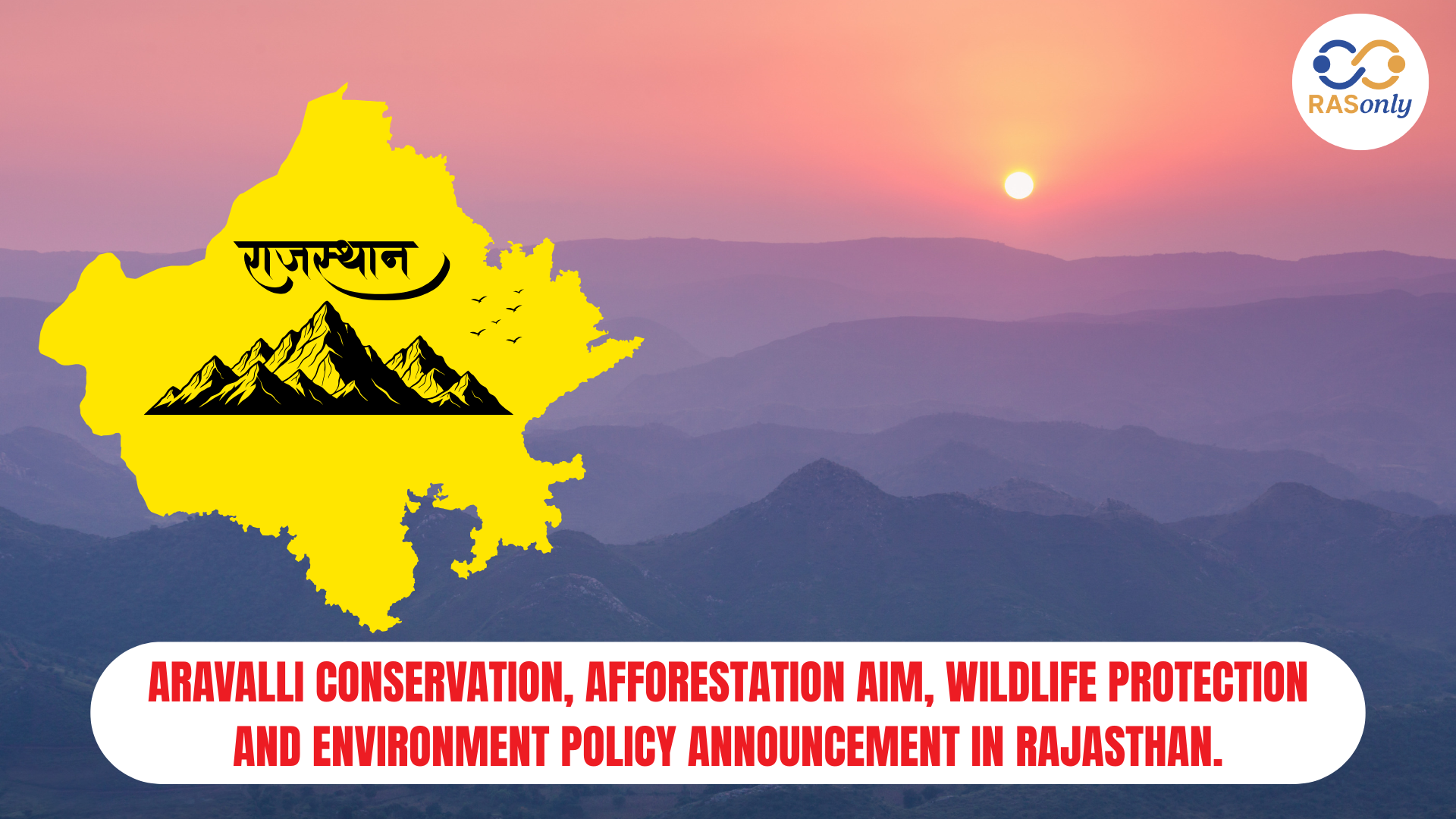
Rajasthan to Boost Skill Training in Border Districts
February 24, 2026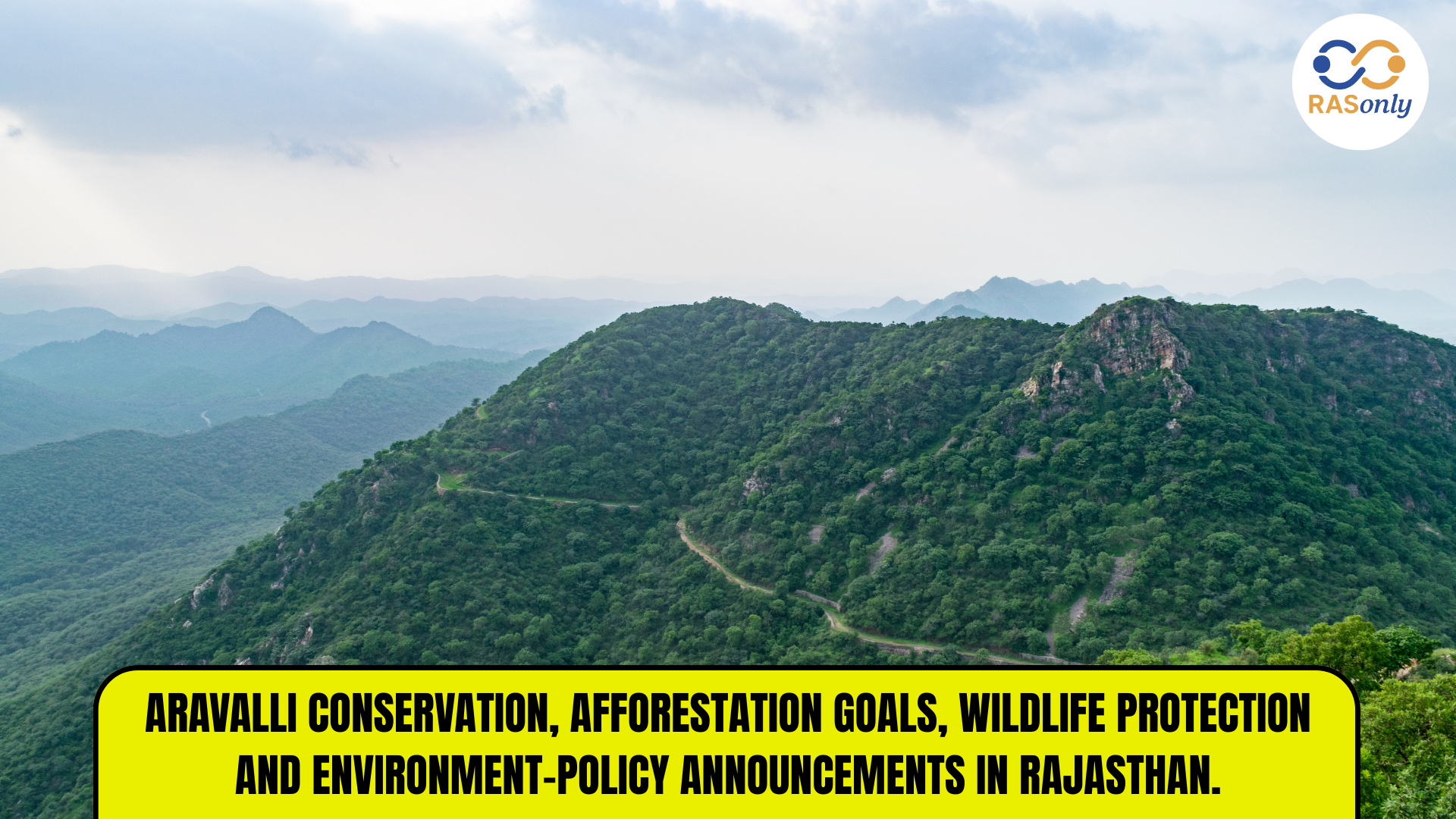
Rajasthan Passes Forest Grants, Boosts Aravalli Conservation
February 24, 2026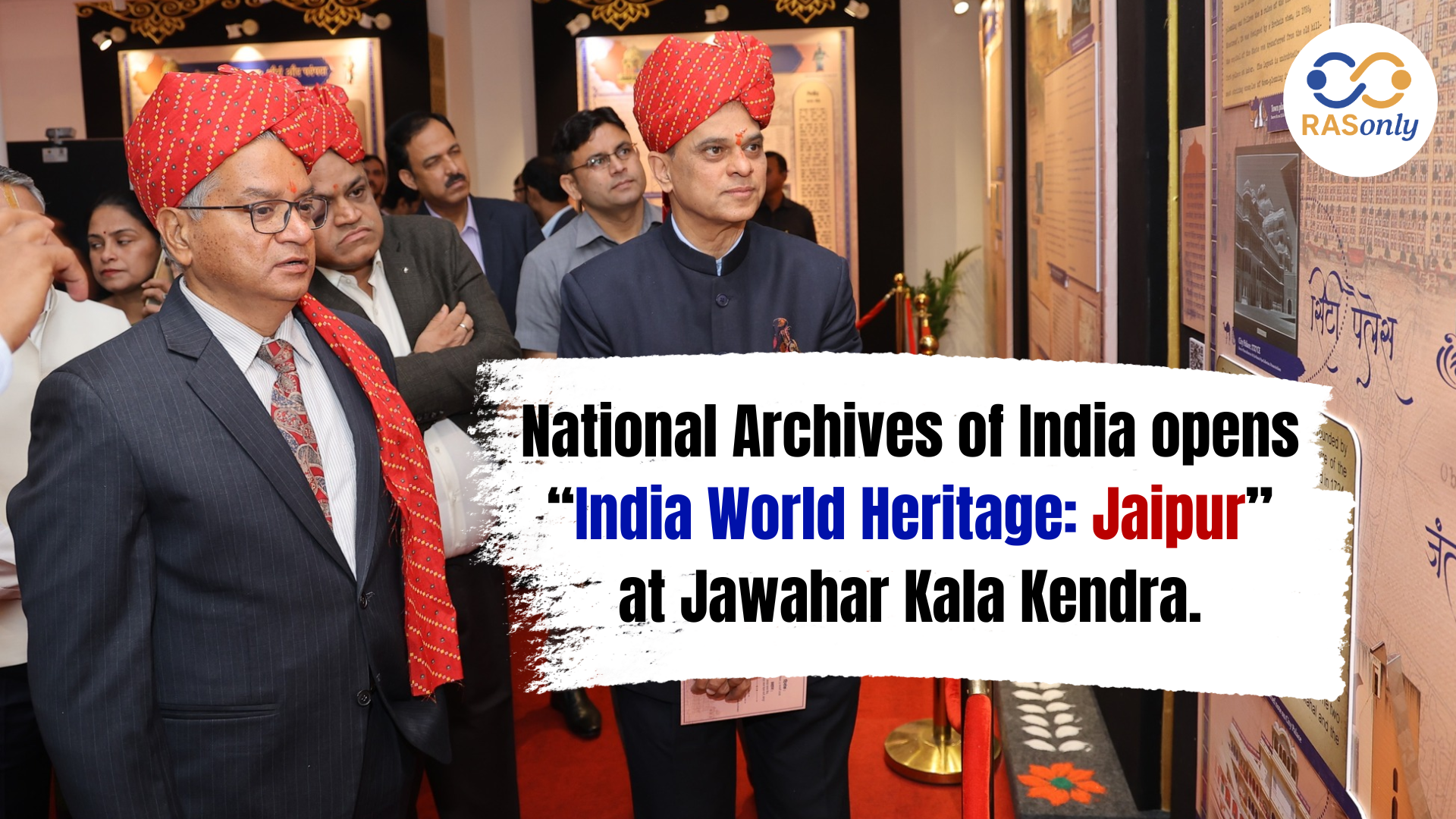
NAI Rajasthan World Heritage Exhibition at JKK
February 23, 2026👉🏻 Register Today to Join Classes! 👍🏻
- Team RASOnly -
🎯 Benefits of RASOnly Coaching:
- ✅ 1:1 Mentorship with RAS Officers
- ✅ Experienced and Expert Faculty
- ✅ Free Library Access
- ✅ Daily Minimum 4 Hours Must
- ✅ Comprehensive Study Material
- ✅ Regular Tests & Performance Analysis
- ✅ Personalized Guidance & Doubt Solving
- ✅ Online & Offline Class Options
- ✅ Affordable Fees with Quality Education
Key Highlights:
- 👉🏻 3-Day Refund Policy
- 👉🏻 New Batch Starting from 04 August
- 👉🏻 Registration Amount: Only ₹1000




